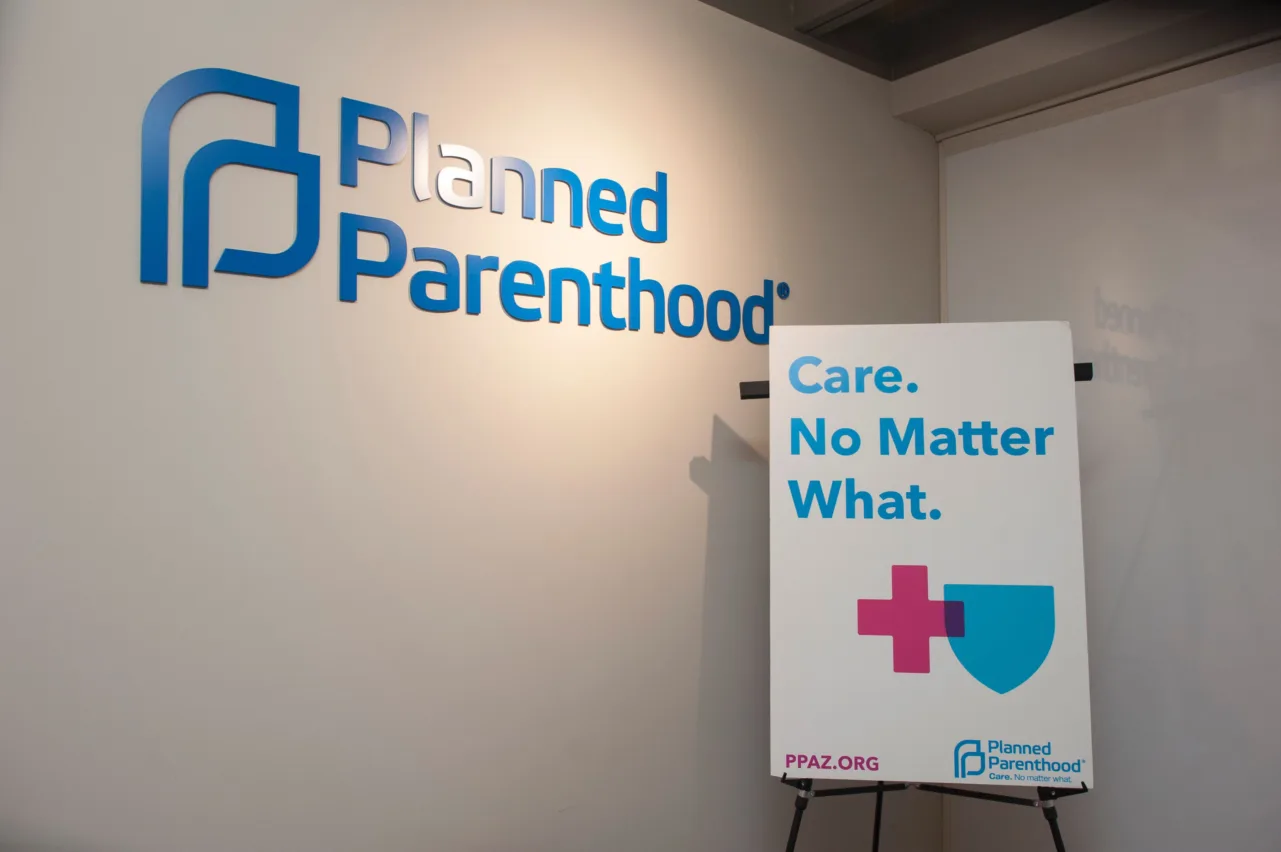
The Planned Parenthood Central Phoenix Health Center sign is viewed in Phoenix on Feb. 2, 2017. (Laura Segall/AFP via Getty Images)
“I don’t know why you need it and it doesn’t matter what you need or why you need it. What matters is you have competent health care.”
Cindy Hans got an abortion when she was 17 years old, and now more than a half-century later, she’s helping Planned Parenthood patients in Arizona access the health care she once needed—by walking beside them.
Hans, now 70, was inspired to volunteer for her work as Planned Parenthood escort by the behavior of those who oppose the organization, saying it’s “awful” that people seeking an abortion or any other reproductive care are often “screamed at by vile people on the street.”
Planned Parenthood is one of a handful of abortion providers in Arizona. Like many abortion clinics around the country, it’s frequently the target of religious extremists and anti-abortion care protestors who hold graphic signs and attempt to discourage people from walking inside.
Volunteer escorts help people avoid or ignore these protesters. Donning colorful vests and often carrying umbrellas to help shield patients, escorts act as buffers between patients and protesters.
Hans said she first heard about volunteer opportunities at Planned Parenthood on Facebook and decided to take a deeper look, because she didn’t like the idea of people protesting others who simply needed medical care.
“At the end of the day, Planned Parenthood provides medical care,” Hans said. She noted that the organization, which has operated in Arizona since 1937, helps people who need mammograms, birth control, assistance with STDs, and abortions, among other services.
“I don’t know why you need it and it doesn’t matter what you need or why you need it,” she said. “What matters is you have competent health care.”
However, access to that health care is currently under attack—not just by street protesters, but by anti-abortion legislators who are eagerly awaiting a state Supreme Court decision that could set abortion law in the state back to the 1860s.
READ MORE: Arizona Supreme Court to hear arguments on 1864 abortion ban
Reproductive care in Arizona today
Despite working to dilute the effects of anti-abortion protesters on the streets, Hans said she’s concerned that access to reproductive care is declining in Arizona and the country as a whole, thanks to anti-abortion legislation.
“If you were to restrict my dentist, I would say that dental care in Arizona is being reduced,” Hans said. “That goes for anything. I don’t want my doctors or any of my health care people to be restricted in practicing their craft for which they have trained for decades.”
“The more restrictions you put on a doctor, the more you tell them their medicine practices can be illegal, the people who suffer the most are the patients, because now they have restricted options of health care,” she continued.
Arizona lawmakers are currently attempting to further restrict abortion. The Arizona Supreme Court will soon decide whether to reinstate an 1864 territorial law that fully bans abortion unless the procedure is needed as a life-saving measure for the mother.
On the other hand, reproductive rights activists are rallying to get abortion completely legalized with a ballot measure in the 2024 general election. The initiative needs just under 400,000 signatures by early July to put it on the November ballot.
In the meantime, escorts like Hans will continue their work on the ground, helping patients access reproductive health care while they still can.
What’s it like to volunteer around protestors?
Hans works about an hour-and-a-half to two hours per shift.
“Planned Parenthood is very serious about safety,” she said. “[Escorts] sign in, we always greet each other and make sure we have enough water.”
“Sometimes the protestors are there when we get there. Sometimes they’re not,” she said. “Sometimes they will talk to us, and we are trained … to never engage. We do not engage because it is pointless. I am not going to change their minds, they are not going to change my mind.”
Hans said that while she’s there to help Planned Parenthood keep a safe environment for its patients, the protesters sometimes make enough commotion that they risk the safety of others beyond the clinic’s property.
“Sometimes they stand right where the cars need to turn,” she said. “So you’re trying to turn and they will come up to your car and try and give you a paper of some kind. They will knock on your window to get you to roll your window down. When people are distracted driving, that’s when accidents happen. So I think that they create, because of their aggressiveness, they can create a very unsafe environment just for people driving. If you slam on the brakes because a human walks up close or walks in front of your car, the guy behind you is going to hit you. That’s unsafe.”
When a potential patient arrives at the clinic, that’s when Hans gets to work. Escorts work in pairs to approach the car and make themselves known to the driver.
“And as soon as the door opens, we say, ‘We are volunteers with Planned Parenthood. We are your allies,’” Hans said.
“And if they are hesitant at all, then we will back up because our goal is to not make them more uncomfortable than they already are by the people yelling on the street.”
Hans said patients tend to be glad to see her.
“Most often they get out and they say, ‘Thank you so much. I’m glad you’re here. What are these people yelling about?’” she said. “My standard answer is, ‘They want to drive your car in their lane. We think you’re driving just fine. You’re going to drive your own life. That’s the way it should be.’”
Anti-abortion protestors sometimes spread misinformation, Hans added, holding signs that say things like, “Ask us about the abortion-reversal pill.”
“It scientifically does not exist,” Hans said. “So it’s scary that to think that some people go to them for advice in a time when—I mean, pregnancy, in the best of circumstances, is a hard thing. I have three children of my own. I’ve done this, and it can be very dangerous. To seek medical advice from someone who doesn’t understand science or biology is quite scary to me.”
READ MORE: What’s it like to be an abortion provider in Arizona right now?
How to become a volunteer
Anyone can apply to volunteer as an escort for one of Planned Parenthood’s clinics in Tucson or Phoenix. Trainees take a two-hour course that teaches non-engagement tactics and how to approach patients.
Hans estimates that she applied sometime in 2017 or 2018, providing references to ensure that she wasn’t acting in bad faith.
“So they called my references. They wanted to know what kind of person I was, and then I was approved to go to training,” she said.
The application form today doesn’t have a reference request, but it does ask things like why you’d be interested in volunteering and what you’d like to gain from your experience as a volunteer.
The Planned Parenthood website states that the clinic escort program started in 2016, has over 100 escorts at three health centers across Arizona, and escorts around 16,000 patients annually.
Subscribe to The Copper Courier’s daily newsletter! We keep it 💯—just like the temperature.
Support Our Cause
Thank you for taking the time to read our work. Before you go, we hope you'll consider supporting our values-driven journalism, which has always strived to make clear what's really at stake for Arizonans and our future.
Since day one, our goal here at The Copper Courier has always been to empower people across the state with fact-based news and information. We believe that when people are armed with knowledge about what's happening in their local, state, and federal governments—including who is working on their behalf and who is actively trying to block efforts aimed at improving the daily lives of Arizona families—they will be inspired to become civically engaged.


Rep. Ansari skips Trump inauguration in favor of annual MLK Day March in Phoenix
Rep. Yassamin Ansari did the same thing this Martin Luther King Jr. Day that she had done for the past several years: march the streets of Phoenix...

From bar to barre: Where we’re going this Dry January
Written by Sarah ConliskFor many, it's hard to imagine surviving the holidays—interacting with family, mingling at the office party, passing the...

NAU professor’s new video game transforms health education
"Health Quest," a game by NAU professor Hayley Root and artist Kevin Clark, blends fitness education with immersive gaming. In an innovative fusion...

U of A researcher’s astounding discovery about human-canine companionship
An exciting University of Arizona-led study found that people may have formed close relationships with dogs in the Americas 12,000 years ago. The...





